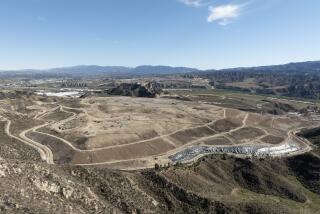Nuclear Dump Operator
- Share via
I am writing this letter in response to your Nov. 14 editorial on the recently licensed Ward Valley low-level radioactive waste facility, based as you note on a Business Week story, which is rife with errors.
* MAXEY FLATS, KY.--No plutonium ever leaked off-site from the LLRW facility at Maxey Flats, nor was the site closed due to environmental problems. The facility, originally developed jointly by the state and U.S. Ecology, was ultimately closed by the state after it voluntarily acquired the company’s leasehold interests. The state then assumed the role of owner, operator, licensee, and licensor. After eight years of providing custodial care and maintenance, the state proposed that the site be placed on the Superfund list. California’s former Department of Health Services Director Kenneth Kizer wrote in a Sept. 30, 1986, memo regarding U.S. Ecology:
“Based on correspondence with the State of Kentucky, the Department of Health Services has concluded that the company operated the site in accord with what were then considered good practices.”
According to the EPA, closure of the Maxey Flats site will cost $33.5 million, not $100 million. The Maxey Flats site was not closed because of leaking plutonium.
* SHEFFIELD, ILL.--The Illinois attorney general brought suit against U.S. Ecology in a dispute about closure costs, not radioactive leaks. As Dr. Kizer stated in his memo: “The dispute in Illinois centers around custodial care of the closed (LLRW) facility. The U.S. Nuclear Regulatory Commission is in conceptual agreement with U.S. Ecology on all technical matters at issue in the suit.”
The suit has since been settled and the closure work successfully completed.
The Sheffield site was not closed because of radioactive waste leaching.
* BEATTY, NEV.--Contrary to what the Business Week article stated, U.S. Ecology’s Beatty LLRW facility was not “closed several times . . . for numerous violations.” In 1977, U.S. Ecology discovered and reported to its regulators that several of its employees, in violation of company procedures, had removed some radioactive materials from the site. Disposal activities were temporarily suspended while steps were put in place to prevent recurrence. This was the only time the Nevada site--or any other site operated by U.S. Ecology--was ever closed for operator non-compliance.
The LLRW site was closed last Jan. 1, not because of any environmental problems, but because specific provisions of the federal Low Level Radioactive Waste Policy Act went into effect. Gov. Bob Miller closed the site for political reasons related to accepting waste from California and other states, as his quote in Business Week about the “amount of waste” reflects. The site was not “closed several times for numerous violations.”
Contrary to the impression given by your editorial, no public health problem has ever resulted from either site. These recent attacks on U.S. Ecology’s record by your editorial writer reflect a distortion of fact, a rewriting of history and ignorance of the California’s own independent investigations and conclusions.
If your editorial writer had performed appropriate research, he would have discovered the errors in the Business Week article.
We suggest that if you insist on writing editorials based on previously printed materials, you use as a source these words:
“U.S. Ecology does have the greatest experience in this infant business of radioactive waste disposal, and the firm’s painstaking work so far in California is impressive.” They are taken from a May 3, 1987, Times editorial.
HARRY J. PHILLIPS JR.
Chairman, American Ecology
Houston
More to Read
Sign up for Essential California
The most important California stories and recommendations in your inbox every morning.
You may occasionally receive promotional content from the Los Angeles Times.










